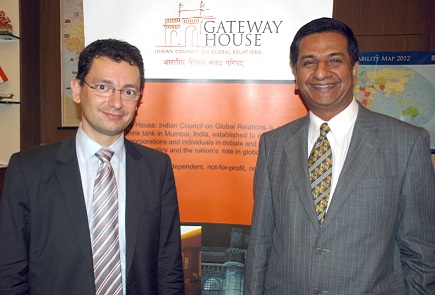
As the European economic crisis worsens, questions have been raised over the adequacy of the steps taken to deal with the crisis. The European Central Bank’s recently launched bond buying plan, the Outright Monetary Transactions program, has garnered mixed reviews; although the external trade balance is improving, financial contagion continues to be a possible threat. However, even as France and Germany get drawn into this crisis, the common interest still lies in preserving the integrity of the Eurozone. What are the changes that are necessary to harmonize the planned overhaul of the Eurozone institutional framework? How successful would the concept of Eurobonds be?
On November 1, Gateway House hosted Nicolas Veron, Visiting Fellow, Peterson Institute for International Economics, in conversation with Gateway House’s Senior Adjunct Geoeconomics Fellow K. N. Vaidyanathan. They analysed the ongoing crisis in the Eurozone, and deliberated on the possible outcomes of the same.
Nicolas Véron is the co-founder and a senior fellow at Bruegel, a Brussels-based think tank, and a visiting fellow at the Peterson Institute for International Economics, in Washington DC. His research is mostly about financial systems and financial reform around the world, including global financial regulatory initiatives and current developments in the European Union.
K.N. Vaidyanathan is the Chief Risk Officer of Mahindra & Mahindra. He earlier served as the Executive Director of SEBI. An MBA from the Indian Institute of Management, Ahmedabad, Vaidyanathan is a Member of the Finance Board at IIM, Ahmedabad and is Gateway House’s Senior (Adjunct) Fellow for Geo-economics.
Gateway House meetings are for members and special invitees only, and they are off-the-record and not-for-attribution. If you are interested in becoming a member, click here for more details.
